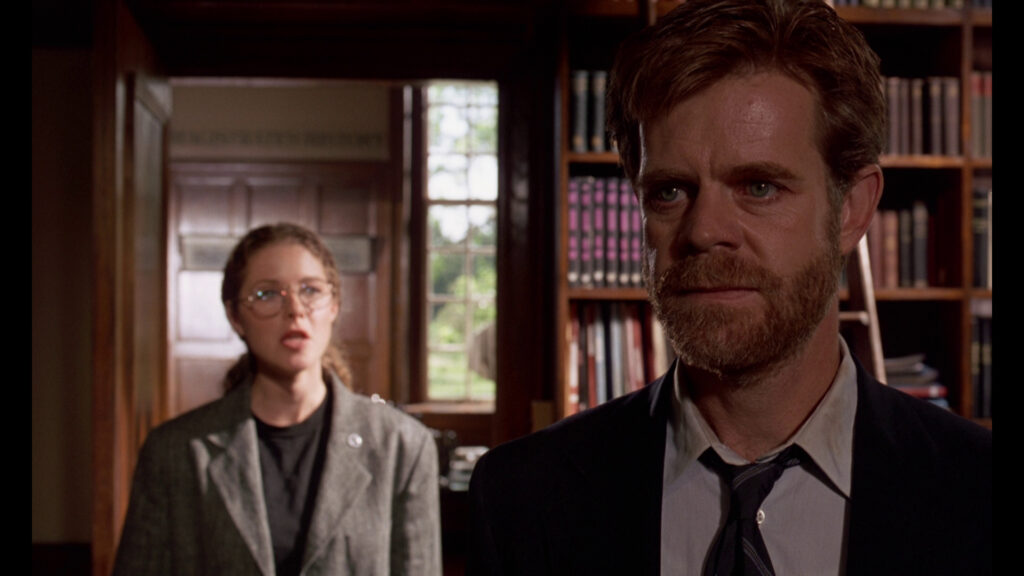Thursday
Yesterday I mentioned absolutely hating the new film version of Sir Gawain and the Green Knight. When I was in Slovenia, I encountered a play that I also hate but am rethinking after hearing a philosophy student’s presentation. I’m still not won over by David Mamet’s Oleanna but am now seeing it in a new light.
Oleanna is basically a “he said, she said” sexual assault case where one is never able to determine entirely what happened or who is at fault. In that way, it differs from the recent film She Said, which I saw while in Ljubljana and in which the guilty party is evident. The question there is whether film producer Harvey Weinstein, a harasser and rapist, can be exposed, not whether he is guilty. Although Oleanna, like the 2019 She Said book by New York Times reporters Jodi Kanto and Megan Twohey, was also made into a movie, I suspect that She Said will do better at the box office. Audiences generally prefer to have clarity in their crimes.
Rightwing David Mamet gets to beat up on two of his favorite targets in Oleanna: entitled professors and radical feminists. Working class Carol, out of her depth in professor John’s college class, goes to him for help, during which time he repeatedly talks over her, not really hearing what she’s saying. Misunderstandings between them compound until, by the second act—bolstered by a shadowy feminist group—she returns making accusations of sexual harassment and eventually rape. He is denied tenure, fired, and in the end resorts to violence against Carol.
The Slovenian student was writing about the play because she had recently seen a professor fired for false accusations (or so she believed) of sexual harassment. For her, the professor in the play is innocent. For me, on the other hand, John is at least guilty of a kind of mental abuse, failing to truly listen to Carol but using his entitled position to impose his narrative on her. Entitled professors are a particular peeve of mine since I believe we are meant to serve our students, not egotistically take advantage of them.
From what I see of his teaching, John should be denied tenure on the basis of that, along with his corrupt grading practices (he promises Carol he will give her an A if she comes to regularly meet with him). If he didn’t feel so privileged, he wouldn’t have gotten into this situation in the first place. I see him setting himself up for his own fall.
But more than that, I see playwright Mamet as a privileged man himself revealing his obsession with assertive women, who he fears will emasculate him. The play, in this way, is a depiction of white male panic–which, as we are seeing in the United States right now, too often concludes in violence. (Male insecurity is also at the core of Glengarry, Glen Ross, which in my opinion is a far better play.) And because panic drives the narrative, Carol seems a caricature of feminism, not a real person.
She especially seems unreal when, bolstered by her feminist friends (whom we never see), she returns and makes her accusations. Suddenly, bolstered by feminist discourse and victim protections that didn’t exist before the 1970s, she has found a way to change the power dynamic. While I can see why that would appeal to her, her robotic words don’t strike me as convincing.
They did ring a bell with the Slovenians, however, especially with the philosophy professor who had invited me to hear the student’s presentation. Eva Bahovec, a decades-old friend, heard in the student the political dogma that she used to hear from party bureaucrats in socialist Yugoslavia. For her, the Mamet dialogue was only too recognizable.
It was a strange reversal. Here was I, a man, attacking the male professor for his sense of entitlement while Eva, a feminist academic who is attracting Slovenian women to the traditionally male discipline of philosophy in very exciting ways, was critiquing the feminist student.
Looking at my own response, I believe my own extra fury came from seeing what I regard to be a caricatured version of my profession. Because I resented being lumped in with such a professor, I lashed out at the play. But I must acknowledge that this is how satire often works, with the author using caricatures to generate wide-ranging and heated debates. As I sat in a coffee house afterwards with Eva’s students, I wondered whether I shouldn’t credit Mamet for the lively discussion that ensued. When they, like Eva, went after the student, I speculated that there might be more to the drama than I previously thought.
